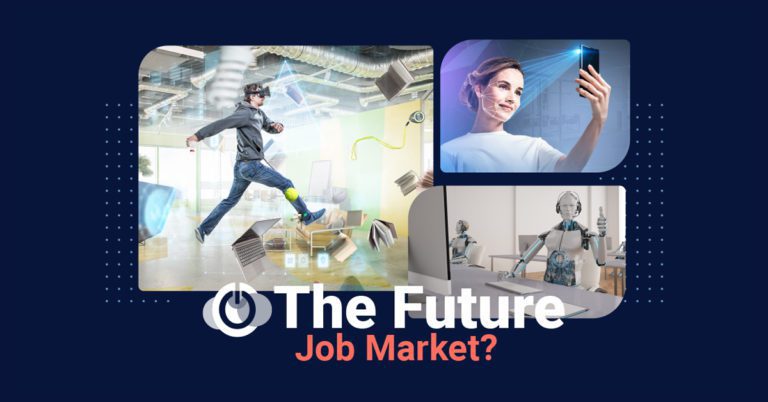Robots, Virtual Offices, and Shorter Workdays? This Is (Maybe) How Our Future Job Market Will Look Like
So what does our crystal ball say about the future job market? Well, we predict 6 trends that all, in one way or another, will change the way we think and do work. Take a seat and read along about what you, as an employer, should prepare yourself for in the future.
“The best way to predict the future is to create it.” Peter F. Drucker’s words make sense, but after experiencing Coronavirus and its aftermath along with war and inflation, we are perhaps rightfully second-guessing the quote. Can we indeed predict anything? Our future has never been more uncertain, and the same goes for the job market because everything in our society affects us at work.
Nevertheless, we can conclude that the job market is changing, and retaining employees has never been more difficult than now. The idea that our job and career are our everything, even our identity, is being reconsidered. Instead, discussions about the impacts of a healthy company culture, different and challenging management styles, and employer branding strategies are changing the job market and our perception of work.
But what then? Should we expect robots as colleagues, virtual offices, or shorter workdays as the future norm? Yes and no is our answer. We have summarized 6 trends that will affect companies, their employees, and their possible job seekers. However, remember that every industry is different, and these trends may be a hit-or-miss for some.
The 6 Trends You Should Know
The work starts now. Note down our suggestions and take time out to talk with your colleagues about them. Try to identify the trends that will affect you and come up with a plan for how to tackle the future.
1) A new workweek
We have tried working remotely during COVID-19, and now many of us have chosen hybrid work after the pandemic, and the next big thing is a 4-day workweek. Several countries have enrolled trial phases with different results.
While a new workweek may work for some and not for others, the point here is to put flexibility on the agenda. Dare to challenge the traditional structures and work models.
2) More hybrid work
If a 4-day workweek may not be something for your organization, try instead to offer more hybrid work. Of course, there will always be pros and cons when choosing a work form, which we discuss in this article.
It is no secret that we are all different. Some colleagues may prefer various working opportunities than you and vice versa, so why not offer such opportunities?
3) New Generations – new demands
Are you familiar with the term ‘Generation Z’ and that Gen Z is slowly entering the job market? The new generation comes with new power and ideas, but they also come with demands for their workplace.
Companies that manage to be well-prepared and open-minded will successfully employ new and young talents. Do you offer flexible working hours, opportunities for professional development, and CSR initiatives that are practiced throughout the organization?
4) Mental health first
Mental health is not only a demand from Generation Z. According to WHO, a poor working environment poses a risk to our mental health. It is therefore crucial to put mental health first. The job market should promote mental health and support employees, whether it is with strategies, policies, or working conditions that focus on this theme.
Despite discussing our future job market, companies must act on it now. Our future is also the day after tomorrow, not something 5, 10, or 25 years away.
5) The battle for talent
The job market seems bright and promising: flexible working hours, the possibility for hybrid work, and a focus on mental health. However, there is a but: the battle for talent is fierce and not an easy challenge.
Along with The Great Resignation, companies must realize that everybody competes for talent. Take the time in your company to review your recruitment process and how the company expresses itself, and understand what works and does not work when trying to hold on to your current employees.
6) Employee retention, employee retention, employee retention
We cannot stress enough how much employee retention must not be neglected now and in the future. Even though we might think much about hiring new talents, maintaining a good relationship with one’s employees is just as important.
So when planning your preboarding and onboarding, intending to make the best start for new talents, remember to consider employee retention with your current employees.
Our Future Is Not Set in Stone
The crystal ball has predicted 6 trends in the job market, but our future is not set in stone. Perhaps other trends will appear, and new challenges will demand our attention. On the one hand, we can predict the future and be somewhat prepared, but on the other hand, it is okay that we do not know everything.
One thing is for sure: change is the norm. People change, and so do our society and job market. At the end of the day, Drucker’s quote is valid: we can indeed play a part in our future and be co-creators.

